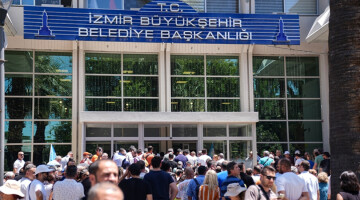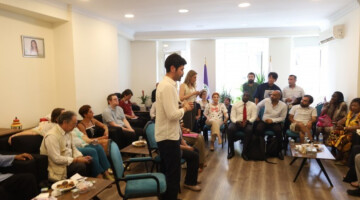The Kurdistan National Congress (KNK) is holding its 23rd Ordinary General Congress in The Hague with the participation of 300 delegates from the four parts of Kurdistan, as well as dozens of political parties, institutional representatives, intellectuals, artists, writers, and opinion leaders from the United States, Japan, Canada, Australia, and European countries.
Arêz Abdullah spoke on behalf of the PUK (Patriotic Union of Kurdistan), Siyamend Muani on behalf of PJAK (Party for a Free Life in Kurdistan), Jalane Hewreman on behalf of the Hewreman Platform, Adil İlyasî on behalf of Rojhilat Komel, and Yakup Mirza, a Syriac delegate, each delivered a speech.
Arêz Abdullah, on behalf of the Patriotic Union of Kurdistan (PUK), read a message sent to the KNK congress. The PUK message emphasized the importance of resolving issues with Turkey in Bakur (Northern Kurdistan) through dialogue and negotiation, and stated that a common ground must be established at the political and diplomatic levels. The message read by Arêz Abdullah stated, “The negotiation table must be operational, and a strong will for a peaceful solution must be demonstrated.” The message also noted that the PUK supports the Kurdistan Regional Government's call for the establishment of a national unity government. PUK emphasized that national unity and internal political harmony are critical for protecting the gains of the Kurdish people, stating, “In this historic process, cooperation is essential to protect the rights and status of the Kurdish people. Gains in the four parts can only be sustained through a strong partnership.”
Speaking on behalf of the Democratic Autonomous Administration of North and East Syria (DAANES), Bedran Çiya stated that Abdullah Öcalan’s February 27 ‘Call for Peace and Democratic Society’ marks the beginning of a vital period not only for Bakur but for the entire Kurdish people.
Bedran Çiya said, “If we have started talks in Damascus, it is because of the call made by Leader Apo (Abdullah Öcalan).” He noted that the participation of many political forces, opinion leaders, and parties in the national meeting held in Qamishlo demonstrated the power of this call. Çiya stated that the Kurdish people in Rojava have waged a great struggle over the past 15 years and developed a solution model. He remarked that women have been at the forefront of this process and that a model based on democratic values has taken shape. “The struggle and gains in Rojava were made possible by the sacrifices of Kurdish youth in the four parts of Kurdistan. Rojava has reached this day with the blood of Kurdish youth in the four parts. These are not just the gains of the people there, but of all the Kurdish people,” he said.
Bedran Çiya stated that the model in Rojava offers a democratic structure where different peoples and beliefs live together, and this structure was directly shaped by the thoughts and philosophy of Öcalan.
“Our struggle is not only for the Kurds. It has also become a source of hope for all the people of Syria,” said Çiya, adding that the national unity developed in Rojava should be taken as an example for all Kurdish people. He emphasized that the role of the KNK is very important and historic, and that the decisions taken and discussions held at this congress are of concern to all Kurdish people.
Sultan Öger, on behalf of the Kurdish Women's Movement, evaluated Öcalan’s call and said that the political processes developing on the basis of this call and the changes in the Middle East are a historic turning point for the Kurds. Emphasizing that unity and collective action are indispensable to protecting the gains achieved by the Kurdish people thus far and securing their status, Sultan Öger said, “We must not miss this historic opportunity. Protecting the gains achieved in the four parts and utilizing new opportunities will only be possible through joint struggle and national unity.”
Sultan Öger said that the Kurdish people are more organized and powerful than ever before, and significant progress has been made in terms of women's organization. Highlighting the importance of commemorating the martyrs and assuming historical responsibility during this process, Sultan Öger underscored the historic role that the KNK congress will play in this context.
Hikmet Serbilind, Chairman of the Kurdistan Islamic Party, emphasized that the Kurdish people have achieved gains at great cost in their century-long struggle, and called for all parties and factions to act in unison to protect these gains and achieve national unity on this basis.
Due to visa issues, KNK delegates from Bashur, Rojava, and Russia participated in the congress via video conference and delivered speeches.
The speeches of the delegates and participants continue with suggestions and discussions.
The congress will continue with sessions tomorrow.










